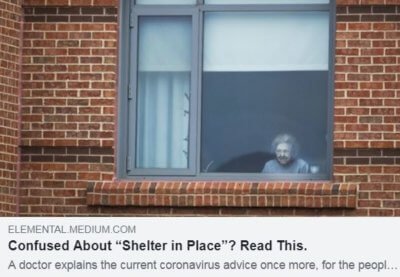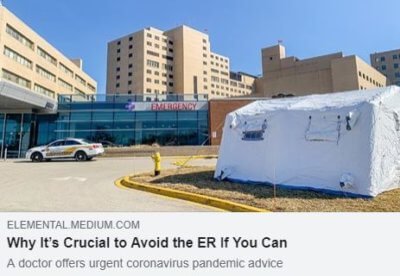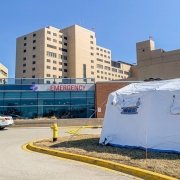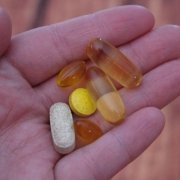Is Sex Safe During the Covid-19 Pandemic?
A doctor offers coronavirus pandemic advice about sexual activity
One hundred fifty-eight million Americans are now under some type of quarantine, and cabin fever is kicking in. Staying home and being alone is harder than we thought.
Endless hours of Facebook passes the time, but we are growing tired of cat pictures on Instagram. Alerts from Snapchat grow tiresome. We have worn out Netflix and Candy crush is getting old.
People may be tempted to check out a favorite dating app like Tinder, Bumble, or Grinder seeking some companionship.
Now is not the time to swipe right.
Covid-19 Basics
Coronavirus is a new virus. This means the human race has never been exposed. We have no baseline immunity or protective antibodies. We do not have a vaccine or effective medication to treat it. We are all susceptible to becoming sick with Covid-19.
Covid-19 is spread through person-to-person contact via respiratory droplets. Droplets first spread through coughing, sneezing, and respiratory particles. These particles get on our clothes and hands. We then pass the virus through handshakes, hugging, kissing, and other close human contacts.
Each one of us and every item we touch is a potential transmission source. Evidence now reveals people are highly infectious before they begin to show symptoms. To protect ourselves and each other, we must limit close contact with others.
As much as we don’t want to hear it, sex counts as close human contact.

Photo by Erik Lucatero on Unsplash
Can we have sex?
Clear cut guidance on sexual contact is unclear. Much is unknown regarding Covid-19 transmission. Sexual contact involves close contact. Respiratory droplets are transmitted through saliva, mucous and physical touch.
If you and your sexual partner are following social distancing guidelines and sheltering in place together, then there is no evidence you should avoid sex. If your partner is showing symptoms such as cough, sneezing, sore throat, fever, or any other viral symptoms then sexual contact should be avoided.
CDC has stated that Covid-19 has not been found in semen, vaginal or cervical secretions. It has been found in feces. Analingus should be avoided.
Healthcare workers must make adjustments. Healthcare workers may be exposed at work making us potential asymptomatic carriers. Social distancing from the health-care worker is likely warranted. This means changes in sexual practices are necessary.
Some healthcare workers choose to shower, wear a mask, and avoid kissing during sex. These steps seem reasonable, but there is no clear cut scientific guidance to indicate if this is safe or not.

Photo by Alex Block on Unsplash
You are your safest sexual partner
New York City public health has released a public service guide to sex during the pandemic. The message is, “You are your safest sexual partner.” There are no restrictions on masturbation. You can not give yourself Covid-19.
Mashable reports a sudden spike in sales for sex toys and aids. Given the unknowns regarding Covid-19, self-stimulation is likely the safest option.
For those who choose to ignore guidelines
We all must take the proper precautions to keep each other safe. For those who decide to disregard the guidelines, please use condoms, birth control, and consider PrEP therapy.
PrEP stands for pre-exposure prophylaxis. PrEp therapy is a prescription antiviral medication to prevent HIV infection for those at risk. When taken daily, PrEP is highly effective at preventing the acquisition of the HIV Virus. It can reduce the risk by 99%.
Sheltering in place
We all must do our part to prevent the spread of Coronavirus. Sheltering in place will not work if only some of us follow the guidelines.
We will succeed if we all do our part. We are in this together.
Do I still need condoms?
Safe sex practices with latex or polyurethane condoms are recommended unless you are in a monogamous relationship with a trusted partner. Condoms should still be used even if you are on PrEP as it does not prevent gonorrhea, chlamydia, syphilis, trichomoniasis, HPV or any other STD.
What to do if you feel sick?
As testing availability increases across the country, we will see an increase in the number of cases. Many more will experience symptoms. It is tempting to go to a hospital or urgent care facility for testing. For the vast majority of patients, an ER visit is a wrong move with potentially catastrophic consequences.
Only those experiencing severe symptoms, such as difficulty breathing, need in-person medical evaluation.
Each patient who presents to an ER exposes other patients and medical providers to the infection. Once exposed, the medical provider is quarantined removed from duty. We are seeing doctors and nurses getting sick all over the country. We need as many doctors, nurses, and hospital staff to care for those in need as possible.
Thank you to BeingWell for publishing this article on Medium.
Blog Author: Dr. Jeff Livingston















